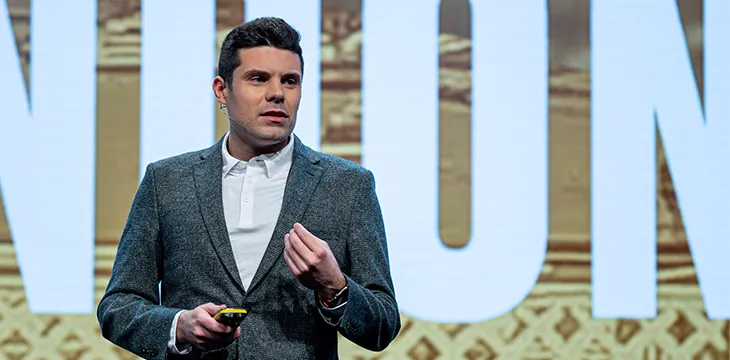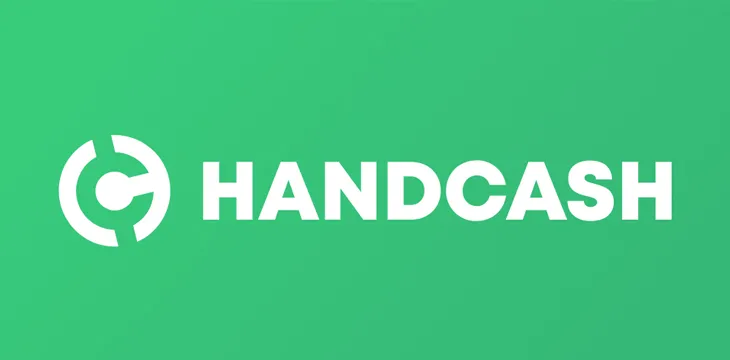|
Getting your Trinity Audio player ready...
|
HandCash is a leading wallet provider for the Bitcoin SV ecosystem that is best known for its pioneering approaches to make Bitcoin as user friendly as possible. Other digital currency app developers have already been more than inspired by HandCash’s design.
CoinGeek’s Michael Wehrmann caught up with Alex Agut, Rafa Jiménez and Ivan Mlinarić from HandCash to talk about Bitcoin app design, inter-wallet competition, Bitcoin computation and more.
Hello Alex, Rafa and Ivan! Kindly introduce our readers to what HandCash is and what role each of you fulfill in the HandCash team.
Alex Agut: I’m one of the co-founders and CEO at HandCash, and my roles are mostly product design and dealing with the business side: raising money, marketing and paperwork.
Rafa Jiménez: I’m the (other) co-founder and CTO at HandCash. I’m responsible for the technological decisions to fulfill the vision of our company, provide the resources to our development team as well as create and implement our team culture. Also I do a bunch of coding, of course!
Ivan Mlinarić: I’m the senior software engineer. Joined almost a year ago. I am responsible for our cloud infrastructure and domain knowledge/logic.
HandCash’s website slogan is “Bitcoin for the rest of us.” What does it mean?
Alex Agut: While others have been trying to please the cryptocurrency crowd for the last 10 years, we feel our place in this ecosystem is to make this technology more accessible and valuable for the rest of the world.
HandCash is best known for its astonishingly simple user interface. Some months ago, we have seen a well-known BCH wallet provider—with way more funding than you have—more or less copying your entire UI. Is there any way for HandCash to protect its UI against blatant copying?
Alex Agut: No. In fact, we think it’s a strong positive signal that companies all over the world are looking at our company for leadership in terms of usability, design and mindset. We keep innovating and we have things in development which are years ahead of anything out there—next time it’ll take a few years for others to catch up—but they will try. You’ll see what I mean.
What does it tell us if a well-funded BCH wallet provider actually pays attention to your creations? Are you setting new standards for digital currency apps in general?
Rafa Jiménez: Innovation means providing new products that are accepted. It sort of validates the work our team is doing. We are actually working on the next iteration of digital currency. We have seen credit cards, then we had PayPal and the next generation is HandCash with Cloud Money to make money more connected and accessible. So new technology requires new standards.

Ivan Mlinarić: We like to focus on a handful of things we see as important but not properly addressed in the world of digital currencies. If others later copy us that usually means we were right about it.
Alex, you have tweeted that copying a design is never the same as actually creating it, as there is more to design than just design decisions on the surface. Kindly elaborate on that.
Alex Agut: I believe that design is about how things work, not how they look. If you are blindly copying the placement of buttons and screens, without knowing the “why” behind those decisions, you’ll never understand the essence of your product. The UI is just the culmination of your intent, your purpose. There’s a process behind it.
How is HandCash actually making money? And how do you plan on making even more money?
Alex Agut: To be honest, our only source of income at the moment is our merchandising, thanks to an exclusivity agreement with Zeroconfs.com, but we will start monetizing in a more meaningful way very soon through Connect, some neat fiat ramp systems and other stuff. At the same time we realize monetizing or not at this stage won’t move the needle one bit as this industry is barely starting and there are still a lot of innovations needed to get to a point where we can market this confidently to normal people.
HandCash and Money Button recently surprised Bitcoin SV users with a huge press release concerning the implementation of an inter-wallet peer-to-peer collaboration. Kindly introduce our readers to this implementation and the implications of that.
Rafa Jiménez: It was a great announcement! Using the Bitcoin network has become the standard way for the wallets and services to communicate to each other. This approach is highly expensive for services with many users that use their wallets frequently as we need to constantly monitor each transaction in the network to find out which one is relevant for our users.What we announced was a different communication channel based on Paymail, so the different wallet providers can communicate to each other directly (P2P) instead of using the Bitcoin network thoroughly. The Bitcoin network should be reserved just for the miners. This is just part of the original recipe of Bitcoin.
Ivan Mlinarić: IP2IP transactions are something that was part of original Satoshi’s bitcoin client. But after he left functionality was removed, because it was never fully implemented. Yesterday we were joking we are now fulfilling Theymos’ vision because there is an old thread on bitcointalk where core developers decided to remove it from the code base. And Theymos was the only one in favor to rather finish it. He was overruled. If you know his role later in the small block and everyone needs to run a full node debate it is a pretty fascinating read.
Our main motivation here is to go P2P as soon as possible as this is primarily a scalability solution. We cannot afford that one single enterprise adopts BSV and surprises us with lots of traffic on the BSV network. One big entity can literally kill the majority of the apps running now on Bitcoin when it generates lots of traffic. Recipe on how to solve the scalability issue was already set by Satoshi. We chose to extend paymail, because paymail already solved what was missing from Satoshi’s implementation and we actually just needed to add the part he did implement. Money Button did a fantastic job here for us, we are very thankful.
I find this collaboration interesting, because I thought HandCash and Money Button compete for the same users. Is Bitcoin incentivizing businesses to collaborate in new ways other than in the non-Bitcoin world?
Alex Agut: Personally, we don’t consider Money Button our competition, so that makes things easy. We might be trying to reach the same audience right now, but as time passes and the audience gets bigger (the pie grows) the differences will be more noticeable. I even think they can be two great complimentary products and ecosystems, so we’ll see.

Given our friendship, we’ve discussed many times about our shared need of moving away from non-P2P to a P2P kind of network, as it should (just read the title of the whitepaper). So both of our teams decided to join forces as we both had a very similar goal, and it would be a win-win for both of us. We have more to lose by not having P2P in Bitcoin when dealing with other services, and Money Button is by far our biggest “bridge” of transactions (outside of HandCash to HandCash) so it made so much sense to cover most of our transactions under P2P as soon as possible. This will be particularly critical when we launch Connect as part of the HandCash ecosystem.
Help us understand how wallet providers actually compete in the Bitcoin SV ecosystem. Is there an incentive for wallet providers to let users switch to other services easily, or is there an incentive to “lock in” users? Looking at Twitter, Google, Amazon etc., they are essentially all “locking in” users in a way, because otherwise their business models would not work. Users might not even want to have several wallet providers or switch services in general though, but have one that meets their demands perfectly well. What are your thoughts?
Alex Agut: There are many sides to that. While Bitcoin enthusiasts (or “fans”) cheer for interoperability of keys and freedom of movement, both from the business and development side things look a lot differently. There’s a big incentive to create and grow your network effect, and also there are immense advantages of having a custom wallet infrastructure that’s not compatible with others: flexibility for new features, increased security, way less errors, drastically less support tickets… so it’s not a matter of trying to “lock down”, we can’t.
You can always send your Bitcoin away by using paymail, or cashing out to your bank. We can’t and we won’t hold anybody hostage. But does it make any sense to export your private key etc. to another wallet infrastructure and cause UTXO sync issues to both companies and make double spends easier to pull off, when you can just move your money away and get a csv with all your transactions from that service? We think that’s just the old, geeky way of doing things, but doesn’t necessarily create the best products. We are not dogmatic about Bitcoin, we are just using it as a tool to create great products that people love and find valuable.
Rafa Jiménez: We agree with Ryan X. Charles and other entrepreneurs in the space on making the pie bigger instead of trying to monopolize the ecosystem. The possibilities right now are endless, so competing for the same thing would even be a joke.
I have a strong opinion on interoperability. Despite being a desirable feature, it’s very expensive: many different companies have to agree on the same way to operate. It hinders innovation as you can’t change the way to operate even if you find more efficient or more sophisticated ways.
We need to be smart about managing the interoperability/innovation barrier, especially in the growing period we are now! This is why our collaboration with Money Button has a lot of value.
Ivan Mlinarić: The big advantage for a Bitcoin powered wallet is it that company building it can save a lot of operational costs and enjoys the reduced barrier to entry because a startup does not need to build a very expensive closed custom ledger and then spend lots of money on securing it (internally and externally). This part is mostly solved from day one and companies can enjoy competitive advantage over those which are not in this position. But Bitcoin is inherently a public ledger, so the moment you touch it you are entering the interoperable world. Users can always send money to different wallets.But there are also other economic incentives. We cooperate with other wallets and POS providers because talking directly to each other is the only way we can efficiently scale while using sufficient privacy and utilize advanced features Bitcoin provides.
Is it wrong to say your inter-wallet P2P implementation helps Bitcoin SV to scale, or at least helps the Bitcoin SV apps to scale?
Rafa Jiménez: That’s right. The P2P network between users and services is not relevant for the miners at all. So this is a measure to help applications to scale, or in other words to scale the application layer.
Ivan Mlinarić: It’s not wrong at all. It’s exactly that.
As far as I understand, this P2P implementation is between services, not necessarily between customers and merchants. Is that correct?
Rafa Jiménez: Great question. This implementation provides some kind of transaction notifications between services. At the time one service “notified” other services about a transaction, such a transaction was already sent to the miners.In the customer-merchant context, at the time the transaction is sent from the customer to the merchant it has not been seen by the miners yet, because they need to make sure they agree on certain criteria for the transaction like the exact amount to pay or the fees.The context for the implementation we provided doesn’t need to enforce these rules. It’s just people sending tips to each other or people transferring their funds between different services.
Ivan Mlinarić: Yes, this is just a simple push transaction protocol between services/wallets/users. Main use case we had in mind when we designed it was microtransactions. But that doesn’t mean it does not work well for larger transactions, too. It is very similar to BIP270 which covers merchant payments, but is not that. It’s a separate simplified protocol.
Is HandCash working for B2C transactions to be “more SPV” in the future, too?
Rafa Jiménez: HandCash Cloud is flexible enough to introduce new components as SPV. So in case our infrastructure needs to use SPV, it won’t be a problem. Nowadays it’s an approach that adds very little or no value to our stack: our system always has internet connection and the communication with the miners is “free.”
Ivan Mlinarić: We are already working on implementing miners merchant API which mostly covers us to fully utilize SPV. But the main challenge is not the SPV part, but the way transactions are delivered. That is why we focus more on P2P now and less on SPV. But they both work hand in hand to solve scalability issues.
Let us talk about Bitcoin computation in general. Money Button’s Ryan X. Charles stated that, “Bitcoin is going to be by far the largest computer ever (…) And what you can do with the biggest computer in the world is: you can actually compute bigger numbers.” Could this “Bitcoin computer” theoretically be able to compute anything that HandCash is right now doing on other services concerning the backend?
Ivan Mlinarić: Who knows. At the moment this sounds like sci-fi. We are using industry wide adopted technologies which are stable and well tested. We use Bitcoin as a ledger which is also stable and well tested. Starting to move more than that at this point in time to “Bitcoin computer” would be a suicide and tremendous risk as there are so many unknowns and we would completely lose focus on what we want to achieve now.
In case it is theoretically possible, is it right now not convenient enough for Bitcoin SV apps to do so? Are transaction processors (so called “miners”) not yet specialized enough to compute your backend on-chain or in another way?
Ivan Mlinarić: Depends on the app. There is always a space for experimenting. But we do not see there is any infrastructure we could actually utilize. We also don’t want to be the one building it from scratch.
HANDCASH LABS SL. is a Spanish company, right? Can you tell us how European data protection laws set by the GDPR are affecting HandCash?
Alex Agut: Yes, our company is based in Spain. Sure, we work with a London-based law firm, Baker McKenzie. Is one of the top law firms in the world, and they crafted our privacy policy and assessed our team so we are compliant with the most recent rules. They will be periodically reviewing this in case we need to update our policies and practices to comply with whatever the law requires.
HandCash lets users sign up with their cellphone number. Is that for KYC reasons? Does it also increase users’ safety in a way?
Alex Agut: There are many reasons for this. First, yes, we take very seriously that as we are dealing with money, we need to and want to know the real identity behind every single one of our users. Second, it allowed us to have our industry first 2FA system for a non-custodial wallet. Third, it will allow for some cool features in the future, but, right now… it’s a great way to go keyless in a nice, secure way. Sooner than people expect.
I know you cannot comment on how many users you serve, but allow me an educated guess at least. RelayX, one of your competitors, seems to have around 3000 users so far, but RelayX has launched way later than HandCash. Money Button published the number of 150 businesses actively using it and over 1.3 million button swipes so far. My best guess is that HandCash has to be around 6,000-7,000 users. Am I totally off?
Alex Agut: Won’t give numbers but you are totally off. Way more than that. We can confidently say that virtually every Bitcoin SV user is a HandCash user. More than sign ups, we focus on current, real active users—and let’s just say we are very happy about that number, especially when Connect is coming out this spring.
At the CoinGeek Toronto conference in 2019, Mempool’s Lin Zheming pointed out difficulties for wallet providers to reach Chinese users. What are your thoughts on that, and how do you plan to get an even broader user base?
Alex Agut: We are not interested in the Chinese market at the time. Our apps are illegal there so… unless the CCP changes its mind on allowing cryptocurrency apps over there, we won’t be trying to get in trouble with their government by distributing APKs or TestFlight betas in China to circumvent their laws – code is not law. We love the Chinese people and their enthusiasm for this technology, but this is out of our control. If the situation changes, we would love to help the Chinese people access Bitcoin through HandCash.
In a recent hangout with the Bitcoin SV Channel, you mentioned how HandCash is dependent on the Bitcoin SV ecosystem’s growth. How could HandCash reach users aside from the Bitcoin SV ecosystem? Is it possible for you to offer non-Bitcoin related services to people who do not want to use Bitcoin?
Alex Agut: To a degree. We think we are one of the least dependent companies in this small ecosystem on the fate of what others do—we like to do things our way and have as few dependencies with others as possible. We will reach regular people by making an appealing product—and perception will be key. We have a few tricks up on our sleeves, some will call them marketing stunts, and they are in a way. But we think it will work for us, and others are invited to join our movement. Why would we offer fiat or crypto services when Bitcoin is the best money out there? People just don’t know it yet. And there are reasons why this is that way, and there are ways on which we can change that perception. Wait and see!
There is more to HandCash than just the wallet providing service. At the CoinGeek London conference in early 2020, you introduced HandCash Connect. Kindly introduce our readers to what HandCash Connect is.
Rafa Jiménez: It goes beyond a wallet, for sure! We envision an ecosystem of connected apps and games where people can spend and earn money doing what they love. HandCash Connect is a Bitcoin SDK. The fastest and flexible way to build apps on Bitcoin. It’s amazing, because it allows startups to create new business models using the top features of Bitcoin without having to deal with all the jargon that takes months to learn. Also they can take advantage of the same infrastructure we use to serve thousands of users every day. They just focus on what they do the best: creating amazing products. We take care of the rest.
Sounds promising! Thank you very much for your time!
Alex Agut: Thanks for your interest in HandCash! You really did your homework J
Rafa Jiménez: Thank you for your interest in our project!
Ivan Mlinarić: Was a pleasure!

 09-10-2025
09-10-2025 





